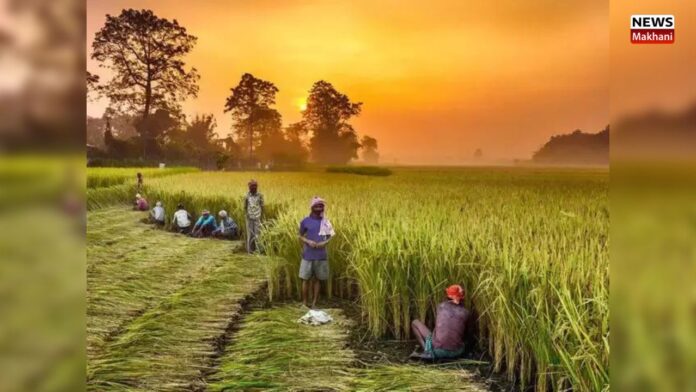Mandla’s Singhpur village becomes chemical-free
Encouraged by Panchayat Minister Shri Prahlad Patel, women farmers enumerate achievements
Bhopal, 25 July 2024
Madhya Pradesh has made a good start for making villages self-reliant by adopting sustainable farming methods following activities of ongoing 16 projects under the Green Sustainable Development Partnership Programme in collaboration with India and Germany.
During a three-day workshop on “Self-reliant Panchayats- Prosperous Madhya Pradesh,” tribal women farmers from panchayats in tribal areas enthusiastically shared their achievements. The event was organized by the Panchayat and Rural Development Department MP in collaboration with the German organization GIZ. Madhya Pradesh is discussing strategies to address the risks of climate change. Local rural tribal women provided detailed information on exemplary activities in different panchayats.
Encouraged by Rural Development Minister Shri Prahlad Patel, tribal women discussed sustainable farming spractices in detail. Rekha, a farmer from Kanshkheda gram panchayat in Mandla district, shared insights on use of cow, cow dung, and cow urine-in farming.
Lakshmi Bairagi, residing in Singhpur village of Mandla district, explained how Singhpur village became chemical-free through nature farming. Organic farming is in practice. She informed that the village has 450 acres of land owned by 120 farmers, including 80 acres of residential land. Plantations are on 12 acres, and fodder is grown on 45 acres. She said that nature farming cannot be done without water, forests, land, cattle, and fodder. She explained that by engaging with the cattle shed, organic manures and pesticides are made using cow urine.
From Jhulooj village, Kanheri Bajjan Gram Panchayat, in Bichhia block of Mandla district, a Kisan Didi shared insights on fish farming in local ponds, poultry farming, and using cattle sheds to produce organic manures. As many as 65 women farmers have developed kitchen gardens and are growing vegetables. They also supply vegetables to anganwadis. The entire village is practicing nature farming. Local farmers are achieving self-reliance in farming, moving away from use of expensive chemicals. From Kavardongri Gram Panchayat, Mohgaon Development Block, it was shared how selling organic vegetables and avoiding chemically grown vegetables is providing quality vegetables to households.
District Panchayat Presidents Hira Singh Rajput of Sagar, Neha Yadav of Shajapur District Panchayat, and Ramchandra Koli of Satna District Panchayat also shared their views. The models of Jeevamrut production plant, plant clinic, and community bioresource center were discussed. The plant clinic operates in Banda, Sagar through which farmers are informed about diseases in plants and their prevention.
In Chandatola village, Mandal district, organic manure and pesticides are being prepared from cow urine . Champa Didi informs that 2000 liters of jeevamrut or bio-manure can be made at once without much effort. Premvati Bai explained that pesticide is made from a mixture of 10 kg gram flour, 10 kg jaggery, 50 liters of cow urine, and 50 kg dung. Farmers in nearby villages purchase these. So far, selling 7200 liters has fetched a net profit of Rs 45 thousand .
Manisha Didi of Shasan village, Sagar district, informs that vermi compost has started. Four tanks have been prepared earning Rs 20 thousand by supplying it in 10 surrounding villages.
Shri Vivek Sharma, Chief Executive Officer of Gwalior Zola Panchayat, provided information about the Patrata App. This gives information about eligibility for drawing benefits of various schemes and document required.
What is GIZ?
It is noteworthy that under the 2022 agreement between the Govt of Germany and Indian, 16 projects are underway in Madhya Pradesh under the Green Sustainable Development Partnership Programme. There are 50 projects running across the country. This agreement will continue until 2030. A meeting for cabinet-level consultations of both countries is scheduled for October this year.
The German government is committed to providing Rs 90,000 crore to India, including Rs 10,000 crore annually. These projects are managed by GIZ and the banking institution KFW.
The agreement intends to share what Germany has learned working on various models of sustainable development over the past decades with other countries.
The second objective is to assist in achieving the sustainable development goals announced by the United Nations land address commitments under 2015 Climate Change Conference Paris.
Currently, work is underway on energy, environment, urban development, and economic development issues. Sixteen ongoing projects in Madhya Pradesh are being expanded, and efforts are being made to increase them further. These projects are focusing on climate change, livelihood mission, agricultural ecology, biodiversity, urban development, and green mobility.

 हिंदी
हिंदी






